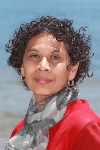 Vicki Kirby (University of New South Wales)
Vicki Kirby (University of New South Wales)
‘New Materialism: A Problem Resolved or Displaced?’
The interventionary importance of new materialist strategies is often explained as a corrective to the over-reach of the linguistic turn and an acknowledgement of the failures of constructionist arguments. A consequence of this freeing up has been a more robust engagement with the sciences, with plants, animals, climate change, geology and even physics. Not surprisingly, the critique of human exceptionalism is an inevitable corollary of this turning outward and away from what now appears as human solipsism. Does this seemingly more generous and inclusive vision, with its apparent liberation of analytical methodologies and research ‘objects’, effectively trump the insights and complexities of the linguistic turn in ways that exceed mere assertion? Where is the reference point that will anchor our evaluation? And should we care if we can’t find one?
Vicki Kirby is Professor of Sociology in the School of Social Sciences, UNSW. She is a prominent figure in new materialist debates and in recent attempts to review the work of Jacques Derrida through a more scientific lens. Books include (ed.) What If Culture Was Nature All Along? (Edinburgh University Press, forthcoming 2017), Quantum Anthropologies: Life at Large (Duke 2011), Judith Butler: Live Theory (Continuum 2006) and Telling Flesh: The substance of the corporeal (Routledge (1997). She has articles forthcoming in Parallax, PhiloSophia, Journal for the Theory of Social Behaviour, and a chapter in David Woods et al. eds., Eco-Deconstruction (Fordham UP).
Suvendrini Perera (Curtin University)
‘See you in the funny pages: Penal sites, teletechnics, counter-artifactualities’
Reflecting on the video recording of the beating of Rodney King in 1991, Derrida asserts, ‘technics will never produce a testimony’ (Echographies of Television 2002). In a context that includes the cell phone images captured by Black Lives Matter activists in the U.S and the CCTV footage from Australia’s Don Dale Detention Centre, I return to Derrida’s commentaries on a teletechnics characterised by artifactuality and actuvirtuality: ‘This virtuality … affects both the time and space of the image, of discourse, of “information,” in short, everything that refers us to this so-called actuality, to the implacable reality of its supposed present’. Through a sequence of CCTV images as they are mediated and re-mediated among inmates, advocates, activists and artists, the paper considers relations of virtual and real, artifactuality and its counter, between the information of technics and the information of the witness
Suvendrini Perera is a John Curtin Distinguished Professor and Research Professor of Cultural Studies at Curtin University, where she also serves as Deputy Director of the Australia-Asia-Pacific Institute. Her recent books include Australia and the Insular Imagination: Beaches, Borders, Boats and Bodies and Survival Media: The Politics and Poetics of Mobility and the War in Sri Lanka. She receives research funding from the Australian Research Council (ARC) and the Canadian Social Sciences and Humanities Research Council (SSHRC). She is the lead researcher on the transnational project, ‘Deathscapes, Mapping State Violence in Settler Societies’, also funded by the Australian Research Council. She is a co-founder of the collective Researchers Against Pacific Black Sites.
 Susan Stryker (University of Arizona)
Susan Stryker (University of Arizona)
‘Breathe: Trans* Life at this Moment in History’
In this keynote address, trans historian and theoritician Susan Stryker explores the necessities and possibilities of trans* politics being inspired by, and conspiring with, movements for racial and economic justice. It conjoins attention to the phenomenology of the breath, the linking of action across material scales, the transversal relationality of oppressions rooted in racializing biopolitical assemblages, the vitality of dreaming, and critical methods drawn from living a transgender life.
Associate Professor Susan Stryker is the Director, Institute for Lesbian, Gay, Bisexual, and Transgender Studies, The University of Arizona. She is a multiple award-winning author, editor, and filmmaker whose credits include the Emmy-winning documentary Screaming Queens: The Riot at Compton’s Cafeteria, the massive, two-volume Transgender Studies Reader, the introductory textbook Transgender History, and popular nonfiction works. In 2014 she became founding co-editor of the new Duke University Press journal TSQ: Transgender Studies Quarterly.
Valerie Traub (University of Michigan)
‘Anatomy, cartography, and the prehistory of normality’
My presentation argues that Western European representations of the human body on maps and in anatomy books in the 16th and 17th centuries offer a genealogy of the concept of the ‘normal’, one of the definitive modes of categorisation and disqualification in modernity. Through a detailed reading of anatomical illustrations and ornamented maps, I demonstrate that anatomy and cartography produced a shared graphic idiom of the human body dedicated to abstracting and plotting the body in space. They thereby contributed to certain cognitive habits that provided the epistemological wherewithal to begin to conceptualise the diversity of humankind by means of classification, comparison, and universalisation, and to apply this systematising habit of thought to populations across the globe. While the style of reasoning born of anatomy and cartography was produced within the ethnocentric parameters of Northwestern Europe, the taxonomies it promoted did not preemptively or straightforwardly abject cultural ‘others’ – although they would provide significant support to later developments of scientific racism. Rather, the convergence of anatomy and cartography participates in a paradigmatic shift in the evaluation of material and intellectual life, whereby a medieval style of reasoning governed by appeals to nature was absorbed into, and gradually superseded by, a modern reasoning based on norms.
Valerie Traub is the Adrienne Rich Distinguished University Professor and Frederick G. L. Huetwell Professor of English and Women’s Studies at the University of Michigan, where she served as Chair of the Women’s Studies Department from 2003 to 2009 and from 2014 to 2015. Working across the disciplines of literature and history, she is a specialist in the study of gender and sexuality in sixteenth and seventeenth century England. She is the author of three monographs: Thinking Sex with the Early Moderns (University of Pennsylvania Press, 2015); The Renaissance of Lesbianism in Early Modern England (University of Cambridge Press, 2002), and Desire & Anxiety: Circulations of Sexuality in Shakespearean Drama (Routledge, 1992, reissued 2014). Both Thinking Sex and The Renaissance of Lesbianism won the best book award from the Society for the Study of Early Modern Women.
